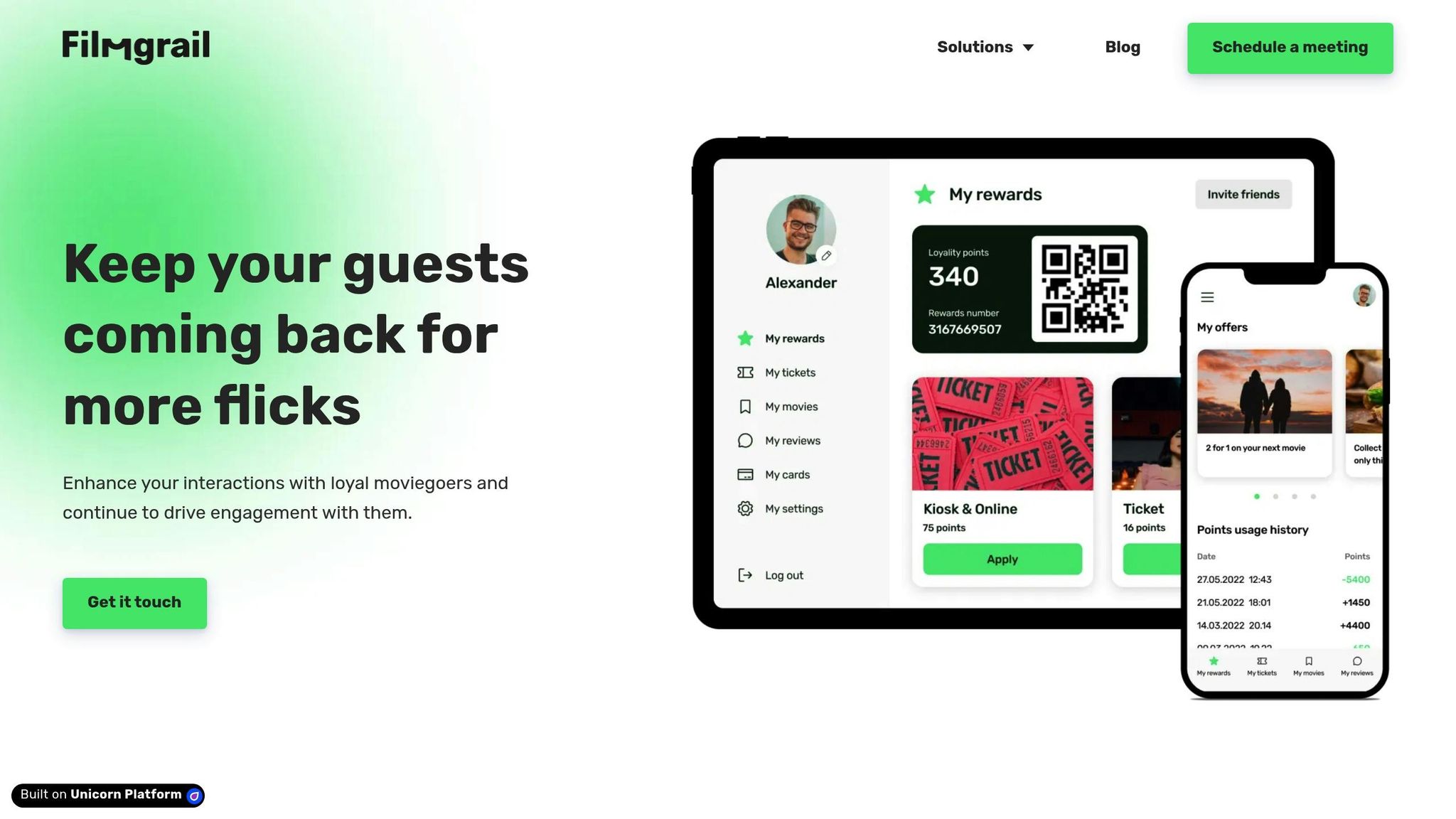Customer data in cinema loyalty programs is a double-edged sword. While it helps create tailored experiences, it also raises serious privacy concerns. Here's why this matters and what cinemas need to address:
- Data Breaches: Loyalty programs are prime targets for hackers due to the sensitive customer information they store.
- Transparency Issues: Confusing privacy policies and unclear data usage practices erode customer trust.
- Regulatory Compliance: U.S. privacy laws like CCPA and CPRA require detailed disclosures, customer data access, and deletion options. Navigating state-specific laws is a challenge for multi-state cinema chains.
- Over-Collection of Data: Gathering unnecessary information increases privacy risks and can conflict with regulations.
- Third-Party Risks: Sharing data with marketing or analytics partners introduces vulnerabilities.
Solutions:
- Collect only the data you need and encrypt it.
- Use clear, simple language for privacy policies and consent forms.
- Provide customers with control over their data through preference centers.
- Stay updated on privacy laws and ensure compliance.
Cinemas that prioritize data security and transparency can maintain trust, encourage loyalty program participation, and reduce risks.
Major Data Privacy Challenges for Cinema Loyalty Programs
Data Breaches and Security Threats
Cinema loyalty programs collect and store a treasure trove of personal information - everything from email addresses and phone numbers to credit card details and viewing habits. Unfortunately, this makes them prime targets for cyberattacks. When hackers infiltrate these systems, the fallout can be severe: financial losses, legal battles, and, perhaps most damaging, a loss of customer trust. The integration of multiple systems often creates additional weak points, making it easier for attackers to exploit vulnerabilities. On top of that, password-related issues, such as users reusing simple or predictable passwords across multiple accounts, can lead to breaches that extend beyond the cinema's own systems. Adding to the complexity is the challenge of clearly communicating how this data is being used, which is just as critical as preventing breaches.
Poor Data Usage Transparency
Even if technical security is airtight, unclear data practices can still erode customer trust. Many privacy policies are written in overly complex language, making it difficult for customers to understand how their information is being used. Some cinemas may request access to features like location services, contact lists, or cameras without offering a clear explanation of why this access is necessary for their loyalty programs. It gets even murkier when third-party partners, such as marketing or analytics firms, gain access to customer data without explicit disclosure. This lack of transparency leaves customers feeling uneasy about how their personal information is being handled.
U.S. Privacy Law Compliance
Navigating U.S. privacy laws adds another layer of complexity for cinemas. State-specific regulations, such as the California Consumer Privacy Act (CCPA) and the California Privacy Rights Act (CPRA), require businesses to provide detailed privacy notices. These notices must outline what personal data is collected, how it’s used, and whether it’s shared with third parties. But compliance doesn’t stop there. Cinemas must also allow customers to access their data, request corrections, or even demand its deletion when it’s no longer needed. The definition of "personal information" under these laws is broad, covering far more than just names and email addresses. For cinema chains with locations in multiple states, juggling these varying legal requirements becomes a major hurdle, especially in the absence of a unified federal privacy law. This patchwork of regulations demands not only strong security measures but also a commitment to transparent and responsible data management practices.
What Are The Data Security Concerns For Customer Loyalty Programs? - Customer First Leadership
Compliance Strategies for Cinema Operators
Tackling the challenges of data privacy and customer trust requires straightforward, actionable strategies.
Data Minimization Best Practices
Start by collecting only the data you truly need for your cinema's operations. This isn't just about following the law - it also reduces your risk and simplifies compliance. For example, when setting up a loyalty program, think carefully about whether each piece of information you ask for serves a clear purpose.
Focus on gathering data that enhances the moviegoer experience, like email addresses, viewing preferences, or purchase history. Avoid asking for unnecessary details like social media profiles, detailed demographics, or location data unless they're absolutely required. The California Privacy Protection Agency has made it clear in recent advisories that businesses must justify every piece of data they collect.
Keeping your data collection lean also makes it easier to secure. Encrypt all stored information, limit access with staff controls and audit trails, and regularly delete outdated data. This streamlined approach not only reduces risk but makes consent and privacy policies easier to manage.
Customer Consent and Data Control
Once you've minimized the data you collect, the next step is ensuring clear and informed customer consent. Trust grows when moviegoers know exactly what data you're collecting and why. Use simple, straightforward language to explain your data practices, and avoid burying important details in fine print. Consent should be requested upfront and transparently.
Recent legal cases highlight the importance of getting consent right.
Preference centers are a great way to give customers control. Design user-friendly dashboards where they can see what data you've collected, update their preferences, or delete their accounts. These controls should be easy to find - not hidden in hard-to-navigate menus. Make it simple for customers to opt out of marketing emails, correct inaccuracies, or download their personal information.
Granular consent options are another smart move. Instead of an all-or-nothing approach, let customers decide what types of communication they want, whether they’re okay with personalized recommendations, and how their data can be used for analytics. This flexibility shows respect for their choices while still letting you provide tailored services to those who want them.
Clear Privacy Policy Development
A well-crafted privacy policy is essential for building trust. Use plain language to address customer concerns directly. Break down complex topics into simple explanations, highlight key points with bullet lists, and organize the content with clear headings so customers can quickly find what they need.
Keep your policy up to date. With 20 states passing data privacy laws as of March 2025 and enforcement actions on the rise, staying compliant is non-negotiable. For example, the FTC’s updates to the Children’s Online Privacy Protection Act (COPPA) Rule, effective June 23, 2025, show how quickly regulations can evolve.
Be transparent about third-party data handlers, clearly explaining who they are and how they protect customer information.
Make your privacy policy easy to find - it should be accessible from every page of your website and mobile app. Update it regularly to reflect changes in laws or practices, and consider sending notifications for major updates. Think of it this way: your privacy policy should be as easy to locate and understand as your movie listings or ticket prices.
sbb-itb-b1b0647
Technology Solutions for Cinema Privacy Challenges
In addition to focusing on data minimization and obtaining clear consent, technological advancements play a key role in safeguarding customer privacy. These tools address privacy concerns while maintaining an engaging experience for moviegoers.
Tiered Data Sharing Options
A tiered data sharing system allows moviegoers to decide how much personal information they want to share. For example, a basic tier might only collect essential data, while a premium tier could gather more details to offer personalized recommendations and special offers. This approach respects individual preferences, giving customers control over their privacy while enhancing their experience.
Research shows that 78% of consumers prefer loyalty programs from brands they trust. This highlights how providing flexible options for data sharing can strengthen customer loyalty. By implementing preference centers with clear explanations of how data is used to improve the customer experience - and offering easy-to-update privacy settings - businesses can foster trust and transparency.
This tiered approach lays the groundwork for how platforms like Filmgrail integrate privacy protections into their systems.
How Filmgrail Protects Customer Data

Filmgrail takes privacy seriously, embedding robust protections directly into its loyalty programs to help cinemas manage customer data responsibly.
Their system includes a user-friendly preference management dashboard, allowing moviegoers to control their data easily. Whether it’s updating communication preferences, modifying movie interests, or adjusting how data is used for recommendations, customers stay in charge of their information while still enjoying a tailored experience.
Additionally, Filmgrail employs encryption and strict access controls to secure customer data. This ensures that privacy is respected without compromising the personalized benefits that customers value in their cinema experiences.
Building Trust with Moviegoers
In the world of cinema, trust is the foundation of meaningful customer relationships. By prioritizing transparency in communication, cinema operators can strengthen bonds with their audiences, laying the groundwork for higher engagement and loyalty. When combined with robust data protection measures, clear communication becomes a powerful tool for creating lasting connections.
Clear Communication About Data Practices
Transparency isn’t just a buzzword - it’s a necessity when it comes to data protection. Making information about data practices both accessible and easy to understand is key. As one best practice puts it, "Transparency is crucial for data protection, requiring individuals to know when, by whom, and for what purposes their personal data is processed". In other words, customers need clear, jargon-free explanations about how their information is being handled.
For instance, instead of vague statements like "data is used for business purposes", cinemas could say: "We collect your email address to send personalized movie recommendations and updates about special promotions at your local theater." This kind of clarity helps customers feel more secure and informed.
Timing also matters. "Information should be provided efficiently and in a timely manner, such as at the beginning of an interaction or service". Presenting privacy details upfront - like during the signup process - ensures that customers are aware of data practices right from the start, rather than having to dig through lengthy terms and conditions.
Customer Privacy Education
Empowering customers with knowledge about their privacy rights is another way to build trust. "Consent for data processing must be informed, requiring accurate disclosure to the individual". This means going beyond simply asking for permission - customers should understand exactly what they’re agreeing to and how it benefits them.
Cinema operators can achieve this by offering detailed privacy policies that outline what personal data is collected, where it comes from, and how it’s used. For example, providing options for customers to opt out of marketing communications - like emails or text messages - shows respect for their preferences. Additionally, "Consent should involve affirmative action, not pre-ticked boxes or bundling with other terms, and users must have genuine choice to refuse or withdraw consent without detriment". Giving customers control over their data fosters a sense of security and ownership.
How Trust Drives Customer Engagement
When customers trust that their privacy is respected, they’re more likely to engage with cinema services in meaningful ways. This trust encourages them to share accurate information, interact with personalized recommendations, and participate actively in loyalty programs. Ultimately, this leads to deeper engagement and stronger customer relationships.
Trust also plays a big role in reducing churn and boosting lifetime value. When moviegoers feel confident their data is handled responsibly, they’re more likely to stick with loyalty programs and recommend their favorite cinemas to friends and family. It’s a win-win for both customers and cinema operators.
Take Filmgrail, for example. Its features - like auto-playing trailers, video stories, and tailored push notifications - are designed to enhance the moviegoing experience. By using customer data exclusively to improve these features, Filmgrail demonstrates a commitment to privacy that resonates with users. This trust makes customers more open to engaging with the platform’s personalized offerings, creating a cycle of trust and enhanced experiences.
Conclusion
Data privacy in cinema loyalty programs goes beyond just meeting legal obligations - it’s a way to build trust and strengthen relationships with customers, ultimately driving business growth. While challenges remain, taking proactive steps can lead to meaningful results. Shifting the focus from mere compliance to a strategic advantage is key to fostering long-term customer loyalty.
Key Takeaways
Here’s what stands out from the strategies discussed:
- Balance is crucial. A successful approach combines robust security measures with open and honest communication. Cinema operators who focus on minimizing data collection, ensuring clear consent processes, and maintaining transparency about how data is used will position themselves as leaders in the industry. These efforts not only meet technical requirements but also build trust with customers.
- Technology bridges the gap. The right tools can address privacy concerns while still allowing for personalized experiences. Advanced platforms that protect customer data without compromising personalization demonstrate how cinemas can strike this balance. By adopting such solutions, operators can safeguard privacy and reinforce trust among moviegoers.
- Trust drives engagement. When customers feel confident their data is secure, they’re more likely to actively participate in loyalty programs, provide accurate information, and even recommend their favorite cinemas to others. This creates a positive feedback loop where strong privacy practices lead to greater customer engagement and, in turn, better business outcomes.
Cinema operators who invest in data minimization, transparent consent, and clear communication will gain a competitive edge in today’s privacy-aware landscape.
FAQs
How can cinemas manage a multi-state loyalty program while staying compliant with state-specific privacy laws?
To navigate the complexities of state privacy laws while running a multi-state loyalty program, cinemas need to prioritize clear and straightforward data practices. This means being upfront with customers about how their information will be used, securing consent when necessary, and customizing policies to align with specific state requirements - especially in states like California and Colorado, which enforce stricter privacy regulations.
It’s equally important for cinemas to stay on top of legal changes and keep thorough compliance records. Working with legal professionals and using tools to track legislative updates can help ensure all rules are followed. Not only does this minimize the risk of legal issues, but it also strengthens customer trust by showing a genuine commitment to protecting their privacy.
How can cinemas clearly communicate their data privacy practices to customers?
Cinemas can strengthen customer confidence by being upfront about their data privacy practices. Start with a privacy policy that's simple and easy to understand. Clearly explain what data is collected, how it’s used, and the measures in place to protect it. Make sure this policy is easy to find on your website and mobile app.
Keep your audience in the loop by using channels like email, social media, and in-app notifications to share updates about privacy practices or address common questions. By staying transparent and taking the initiative, cinemas can show customers that their data is treated with care and security.
Why is minimizing data collection important for reducing privacy risks and meeting privacy regulations?
Minimizing the amount of data collected is a smart move for several reasons. First, it lowers the risk of data breaches and unauthorized access by reducing the volume of sensitive information a company holds. Fewer data points mean fewer opportunities for hackers to exploit, making things safer for both businesses and their customers.
It also helps companies stay compliant with privacy laws like GDPR, which mandate that organizations only gather what’s absolutely necessary. Sticking to these rules not only avoids hefty fines but also shows users that the business values their privacy. This kind of transparency builds trust and reflects a strong commitment to responsible data practices.


